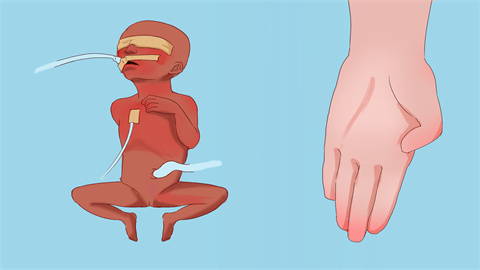What can be done for underdeveloped digestive function in premature infants?
Generally, the main causes of poor digestive system development in premature infants include feeding intolerance, gastroesophageal reflux, necrotizing enterocolitis, congenital lactose intolerance, and congenital intestinal atresia. At this time, physical therapy, drug therapy, and other treatments can be selected according to the specific causes. Detailed analysis is as follows:
1. Feeding Intolerance
Premature infants have weak gastrointestinal motility and insufficient secretion of digestive enzymes. Excessive milk intake or inappropriate milk concentration can easily cause vomiting and abdominal distension. A method of feeding small amounts frequently can be adopted, using formula milk specifically designed for premature infants. When necessary, digestive aids such as compound pepsin powder, lactase tablets, and live combined Bacillus subtilis granules may be used under a physician's guidance.

The lower esophageal sphincter of premature infants is underdeveloped, making it easy for stomach contents to reflux into the esophagus, causing spitting up and coughing. After feeding, the infant should be held upright and burped by patting the back. The upper body should be slightly elevated at a 30° angle while sleeping. When symptoms are apparent, medications such as simethicone emulsion, domperidone suspension, and hydrotalcite suspension can be used under a physician's guidance to relieve symptoms.
3. Necrotizing Enterocolitis
Premature infants have poor intestinal barrier function. Imbalance of intestinal flora or infection can easily cause intestinal mucosal necrosis, manifested as abdominal distension and blood in the stool. Immediate fasting is required, and anti-infective treatment with piperacillin sodium and tazobactam sodium for injection, ceftriaxone sodium for injection, or metronidazole for injection should be administered under a physician's guidance. In severe cases, surgical removal of the necrotic intestinal segment is necessary.
4. Congenital Lactose Intolerance
Premature infants are congenitally deficient in lactase, making them unable to break down lactose in milk, leading to diarrhea and abdominal distension. Feeding should be switched to lactose-free formula milk. Alternatively, lactase drops, Bifidobacterium quadruple active tablets, or live Bacillus licheniformis capsules may be used under a physician's guidance to improve lactose digestion and absorption.
5. Congenital Intestinal Atresia
Developmental abnormalities in the intestines of premature infants lead to intestinal lumen occlusion, preventing food passage and causing vomiting and absence of bowel movements. Early surgical anastomosis for congenital intestinal atresia should be performed under medical supervision. After surgery, feeding should gradually transition to normal based on recovery status. Infections should be prevented with cefotaxime sodium for injection or amoxicillin and clavulanate potassium for injection under a physician's guidance.
In daily life, strict adherence to medical advice regarding feeding is essential, with attention to sterilizing feeding equipment. Keep the umbilical area of the premature infant clean and dry to prevent infection. Closely monitor the infant's mental status, feeding, and bowel movements. Maintain suitable indoor temperature and humidity to avoid colds. Regularly monitor growth and development and adjust feeding plans timely.





